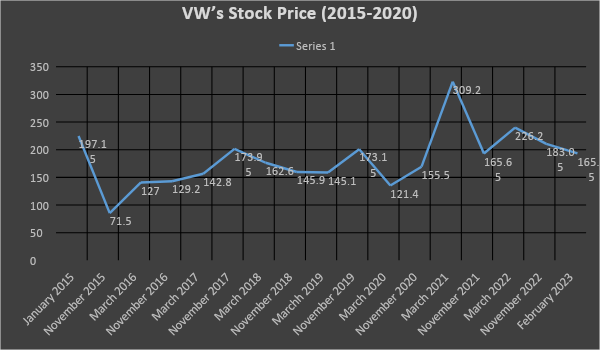Introduction
Fairness and honesty represent some of the foundational characteristics of decision-making in the corporate setting. Without the specified components, a company is doomed to be mistrusted, as the case of VW demonstrates. Namely, the company’s rapid and uncontrollable drop in stock prices observed in late 2015 proves the significance of corporate ethics (see Fig. 1). Though the damage to VW’s reputation has been done, the situation can be remedied by introducing a transformational Leadership approach and encouraging transparency to ensure that the specified issue is avoided in the future.

Analysis
Normalization of Deviance
The case of VW raises the question of how deviant and fraudulent behaviors occur in organizations such as VW, where corporate ethics and the associated ethical standards during decision-making are prioritized. The idea of the normalization of deviance is often introduced as the likely explanation for the observed phenomenon (Davis and Pinto 8). Namely, the normalization of deviance suggests that fraudulent behaviors become acceptable once people demonstrating them face no public reproach since others prefer not to intervene (Saputra et al. 8). Studies show that the phenomenon of deviance normalization occurs gradually and develops into a much more sinister phenomenon, affecting large projects and shaping the company’s decision-making process toward unfair and unjust practices (Davis and Pinto 2). Thus, the threat of cheating and other fraudulent behaviors becomes increasingly common and real.
However, the concept of normalization of deviance does not seem to align with the rigid standards and boundaries that most companies tend to set. Specifically, in a workplace environment where ethical standards are prioritized, the idea of staff members turning a blind eye to an instance of a blatant violation of ethical standards does not seem plausible. Therefore, the absence of rigid ethical standards and effective control tools appears to be the main culprit in the described scenario, along with the lack of a proper leadership framework.
Possible Solutions
The case at hand raises the question of how situations similar to the one observed at VW can be addressed and prevented in the corporate context. To mitigate instances of cheating and corporate fraud, companies will need to reinforce the extent of transparency within their organizational settings. Additionally, a change in the leadership strategy and practice geared toward reinforcement of corporate values and ethics, particularly ethical behavior and decision-making, will be essential.
Specifically, the organization will have to introduce a reporting tool into the workplace setting and ensure that all staff members align with the newly introduced standards for reporting key steps in decision-making within the organization. After the specified temporary solution is introduced, an immediate change in the corporate value system and the leadership approach will have to commence. Particularly, VW will need to reinforce the principles of ethical decision-making and set rigid standards preventing fraud and cheating in the organizational context. In turn, with the introduction of the Transformational Leadership principles, the company will change the staff members’ and managers’ perspectives and value systems toward the ones accepted and promoted by the company. Namely, people- and organization-oriented decision-making will be actively promoted in the VW setting. The identified change will set an example for the rest of the staff members, therefore allowing them to accept the offered values, ethics, and decision-making principles. Consequently, a change in employees’ perceptions is expected to inform their decision-making, thus preventing instances of fraud from taking place.
Furthermore, VW will need to consider the manner in which it approaches the relationships with its employees more closely. Specifically, the propensity toward accepting fraudulent behaviors as tolerance in the organizational context indicates the presence of unhealthy dynamics within the corporate setting. Therefore, to remedy the specified issue, one will need to make the workplace setting more comfortable for staff members. Namely, in addition to the focus on transparency, VW will have to prioritize communication with its staff members. Additionally, the concept of a compromise must be seen as the basis s for the negotiation process (Tayal et al. 17). With the specified changes, VW will remove the reasons for employees to engage in fraud in the first place, thus making the
Additionally, a system of reporting will be introduced to ensure that threats of fraud are identified and addressed accordingly. The specified framework will include anonymous data collection to ensure the safety of staff members and the positive environment within the workplace. With the specified components in place, the problem of fraud is expected to be removed from the corporate setting completely.
Conclusion
The situation observed at VW illustrates the necessity to promote corporate values actively and set core ethical standards with the help of an appropriate leadership framework and a focus on employee engagement. Therefore, it is recommended that the organization should deploy relevant strategies. Thus, VW will attain the set objectives of encouraging fairness within the company and avoiding further instances of fraud.
Works Cited
Davis, Kate, and Jeffrey K. Pinto. “The corruption of Project Governance through Normalization of Deviance.” IEEE Transactions on Engineering Management, vol. 1, 2022, pp. 1-15.
Saputra, Komang Adi Kurniawan, et al. “Preventing Fraudulent Use of Funds Management Operational Support Education.” International Journal of Psychosocial Rehabilitation, vol. 24, no. 06, 2020, pp. 1-8.
Tayal, Akash, et al. “Blockchain‐Based Efficient Communication for Food Supply Chain Industry: Transparency and Traceability Analysis for Sustainable Business.” International Journal of Communication Systems, vol. 34., no.4, 2021, pp. 1-20.